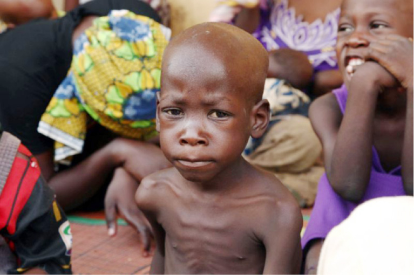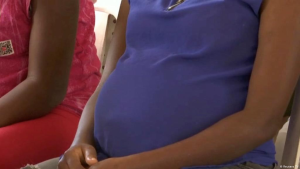
A severe malnutrition crisis is unfolding in Nigeria’s northeastern states of Borno, Adamawa, and Yobe (BAY), with one million children at risk of severe acute malnutrition (SAM) this year—double the number recorded in 2024. Of these, over 600,000 children could face life-threatening hunger in the next six months without urgent intervention.
The alarming figures were revealed as Nigeria’s Minister of Humanitarian Affairs and Poverty Reduction, Prof. Nentawe Goshwe Yilwatda, and the UN Resident and Humanitarian Coordinator, Mohamed Malick Fall, launched a $159 million Lean Season Response Plan to address the escalating food and nutrition emergency. The plan aims to provide life-saving aid, including food, nutrition support, and healthcare, to two million of the most vulnerable people in the region over the next six months.
According to the latest Cadre Harmonisé food security analysis, 4.6 million people in the BAY states are projected to experience acute food insecurity during the upcoming lean season, which begins in June. This marks the sixth consecutive year of severe food shortages in the region, exacerbated by prolonged conflict, economic instability, and climate-related shocks.
Speaking at the launch of the response plan in Abuja, Minister Yilwatda stressed the urgency of the situation. “This plan is not just about strategies—it’s about a promise that no child in Borno, Adamawa, or Yobe should go to bed hungry in a world with enough food,” he said. “No mother should lose a child to a condition we know how to treat, and dignity must never be a casualty of conflict or poverty.”
The UN’s Mohamed Malick Fall warned that humanitarian efforts are under severe strain due to funding cuts, leaving millions at risk. “Humanitarianism is under threat; solidarity is in short supply, and the lack of resources is putting lives—especially children’s lives—in grave danger,” he said.
The crisis has severely impacted healthcare in the region, with up to 70% of health services and 50% of nutrition programs disrupted. Many families, displaced by years of insurgency and climate shocks, rely entirely on humanitarian aid for survival.
The Nigerian government and international partners are calling for immediate funding to prevent a large-scale humanitarian disaster. Without swift action, experts warn that child mortality rates could spike, reversing years of progress in the region.
As the lean season approaches, aid agencies are racing against time to mobilize resources and deliver assistance to the most affected communities before the situation deteriorates further.








